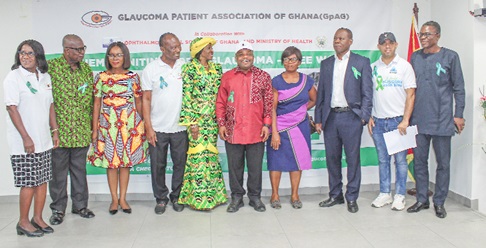
As the global population living with glaucoma surpasses 70 million, with over six million individuals blind from the condition, the situation in Ghana mirrors this alarming trend.
Over 700,000 Ghanaians live with glaucoma, and 45,000 people are blind due to the disease, making it one of the leading causes of blindness in the country. Ghana has the highest prevalence of glaucoma in Africa, second only to Nigeria with almost eight of every 100 Ghanaians aged 30 and above and nine of every 100 Ghanaians aged 40 and above having glaucoma.
The statistics also reveal that one in every five people in the country is blind from glaucoma, highlighting the urgency of the situation. According to data, glaucoma remains one of the primary causes of blindness in Ghana and these statistics underscore the urgent need to address the eye care needs of Ghana's growing population.
Glaucoma is a group of eye diseases that can cause vision loss and blindness by damaging a nerve in the back of the eye called the optic nerve. The symptoms can start so slowly that you may not notice them. The only way to find out if you have glaucoma is to get a comprehensive dilated eye examination
With all types of glaucoma, the nerve connecting the eye to the brain is damaged, usually due to high eye pressure. The most common type of glaucoma — open-angle glaucoma — often has no symptoms other than slow vision loss.
Angle-closure glaucoma, although rare, is a medical emergency and its symptoms include eye pain with nausea and sudden visual disturbance.
Treatment includes eye drops, medication and surgery.
In response to the growing prevalence of glaucoma in Ghana, the National President of the Glaucoma Patients Association of Ghana, Harrison Kofi Abutiate, has urged all citizens to prioritise regular eye check-ups.

He has also called for increased robust public education to create awareness and advocacy campaigns to promote the importance of accessing eye care. To him, free screening programmes to draw attention to vision health care could not be over stated.
With low awareness of the disease, late presentation and diagnosis and poor adherence to follow-up visits, glaucoma remains one of the leading causes of blindness especially among older people.
Apart from surgery in severe cases, patients are put on lifetime treatment to manage the disease. However the high cost of medication is also making it difficult for patients to adhere to the treatment plan.
An Opthalmologist, who doubles as the Chairman of the Ophthalmology Society of Ghana's Glaucoma Working Group, Dr Charles Mensah Cofie, said cost of eye drop for glaucoma for 20 years can build a comfortable accommodation apartment for one’s retirement.
He, however, cautioned against the use of traditional treatment methods for glaucoma explaining that there was no scientific evidence supporting such remedies which has the potential to worsen the condition.
Dr Cofie urged individuals to seek treatment from qualified professionals to avoid irreversible vision loss. He highlighted the chronic and degenerative nature of the disease which means that once vision was lost it could not be restored.
A glaucoma patient, Former First Lady, Nana Konadu Agyeman-Rawlings, shared her personal experience with glaucoma, highlighting its silent nature and the financial burden of daily medication.
She appealed for tax waivers on glaucoma medication to alleviate the financial burden on patients or reduce prices to make treatment more accessible to all Ghanaians.
There is the need for collaborative efforts to reduce the prevalence of glaucoma. Since glaucoma is genetic based it cannot be eliminated entirely but with increased awareness, early detection and intervention, blindness caused by the disease can be prevented.
Various non-governmental organisations (NGOs), including Orbis International, Vision Spring, and Operation Eyesight International, who play crucial roles in delivering eye care services, conducting research, and providing medical products and technologies must increase their effort.
Their efforts complement those of the public sector in improving access to eye care services through infrastructure development, capacity building and the deployment of human resources.
However, despite these efforts, Ghana continues to face significant challenges in combating glaucoma. With the highest prevalence of glaucoma cases in Africa and an estimated 232,500 blind individuals, of which 45,000 are due to glaucoma, urgent action is required to stem the tide of this silent thief of sight.
As Ghana observes World Glaucoma Week from March 10 to 16, 2024, on the theme "Uniting for a Glaucoma-Free World," it is imperative that concerted efforts are made to raise awareness, improve access to quality eye care services, and ensure that no one lives in fear of losing their vision.
With collaborative action, Ghana can work towards realising the vision of a glaucoma related blindness free future for all its citizens.